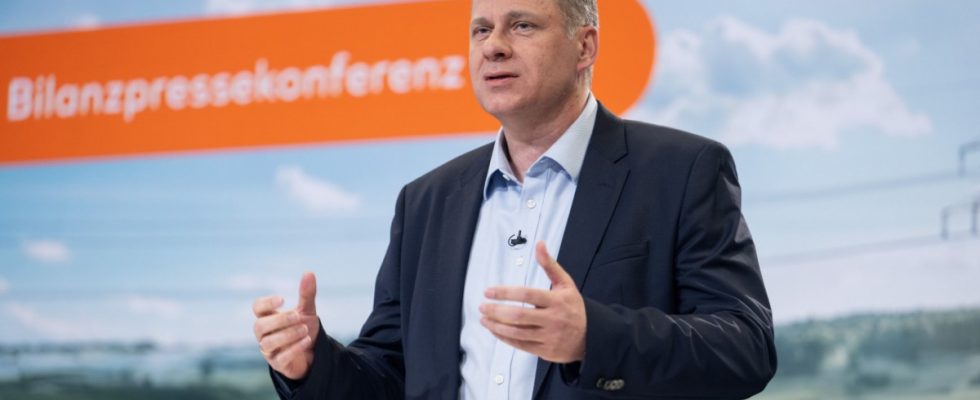So there he is, the new one. The new guy isn’t that new, he’s been with the company for 15 years. But now he has a new position: Georg Stamatelopoulos, 54, made his first public appearance as CEO of the energy company EnBW on Wednesday. The annual press conference in Stuttgart’s EnBW City is not just a numbers event, but also an opportunity to get to know each other. All eyes are on the new boss, who took over the company less than three weeks ago. And now I should present the balance sheet for 2023.
First of all, the native Greek explains his long name. Stamatelopoulos means “successor” and stands for the one who is supposed to help out. His family has been helping out for centuries, he says, and now he’s doing the same in Germany: at EnBW. After the relaxed introduction, he looks at the page in front of him and gives an overview of what the group achieved last year: wind farms, new networks, charging stations. He only looks up occasionally.
The figures are excellent: EnBW was able to increase its operating result by 60 percent, to 6.4 billion euros, and almost double its consolidated profit. Former boss Andreas Schell wrote on Linkedin after his departure that he was handing over EnBW “in the knowledge of excellent business development”. “EnBW is doing well, we are economically successful,” said Stamatelopoulos on Wednesday. Is he adorning himself here with someone else’s successes?
The employees call him “Stama”
To answer this question, it is worth taking a look at the annual financial statements. EnBW made the biggest leap forward in sustainable generation infrastructure, with 70 percent of the growth coming from this. And Georg Stamatelopoulos has been responsible for this board department for a good three years. Until a successor is found, he will continue to oversee the business area in addition to being chairman. “We have a clear plan for the energy transition,” says Stamatelopoulos. This is economically, ecologically and socially necessary.
The EnBW employees have known him for 15 years, they call him “Stama”. When you ask about him in the company, they describe him as a humble person with no airs. After the recent employee event, they responded enthusiastically. He is considered reliable. But of course you won’t judge a CEO by how popular he is among the workforce.
He has been restructuring the company for years. He pushed ahead with the dismantling of nuclear and coal-fired power plants, expanded wind and solar systems, developed hydrogen-capable gas power plants and built up the LNG business in the energy crisis following the Russian invasion of Ukraine. He knows how the energy transition works; he is ahead of his predecessor Schell, who came from the engine specialist Rolls-Royce Power Systems in 2021 from a specialist and non-group background. In Karlsruhe they seem to be happy to be rid of the old boss and are looking forward to what comes with the new one.
Anyone who expected a major change from him will be disappointed by Stamatelopoulos. His talk on Wednesday sounds more like: keep it up. “EnBW is successful, there is no reason to massively change course,” he says. This is what sets Stamatelopoulos apart from his predecessor. Andreas Schell wanted to turn EnBW into a pure electricity company and say goodbye to the gas business, but that would also have meant getting out of the future issue of hydrogen. Under Stamatelopoulos, he admits, EnBW will remain the “only remaining integrated energy company in Germany.” In Karlsruhe they are proud that they really cover everything on the energy market, from generation to grid operation to end customer business, while their competitor RWE does not build any infrastructure and EON no longer produces energy.
EnBW wants to invest 40 billion euros in the energy transition by 2030
This alone does not qualify as a future strategy; this will be Stamatelopoulos’ maturity test, precisely because his predecessor failed to convince the board and supervisory board made up of Baden-Württemberg state representatives and municipalities of his vision. The new guy will have to provide answers in the coming months. How does EnBW feel about gas? When exactly will it phase out coal and replace it with what? Where does the new boss set his priorities, where does he invest and how much?
What he has already announced: He wants to invest 40 billion euros in the energy transition by 2030, almost all of it in Germany. Then he gets political: he demands clear funding commitments from the federal government. The key points of the federal power plant strategy are still “far too vague,” says Stamatelopoulos. “If the power plants are to come quickly, we need clarity quickly and the first tenders this year.” EnBW is currently converting three coal-fired power plants to gas and making them hydrogen-compatible.
The new boss needs fresh people for the energy transition: he wants to hire almost 10,000 new employees in the coming years. Because many are retiring, the bottom line is that 3,500 will be added to the current 28,000 employees. His predecessor Frank Mastiaux, who had developed the former nuclear company towards renewable energies, was also able to increase the number of employees; he was popular because of his motivating and hands-on nature. Now the new one is here, who speaks a bit dryly and matter-of-factly, but has proven his competence . Some people at EnBW are whispering that Stamatelopoulos should have taken over for Mastiaux in 2021. So now he is here.

